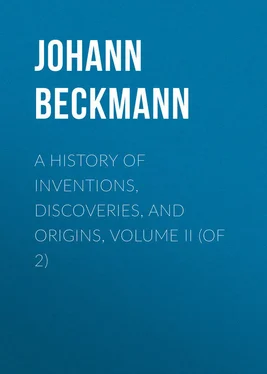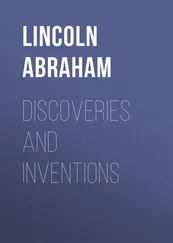Johann Beckmann - A History of Inventions, Discoveries, and Origins, Volume II (of 2)
Здесь есть возможность читать онлайн «Johann Beckmann - A History of Inventions, Discoveries, and Origins, Volume II (of 2)» — ознакомительный отрывок электронной книги совершенно бесплатно, а после прочтения отрывка купить полную версию. В некоторых случаях можно слушать аудио, скачать через торрент в формате fb2 и присутствует краткое содержание. Жанр: foreign_antique, foreign_prose, на английском языке. Описание произведения, (предисловие) а так же отзывы посетителей доступны на портале библиотеки ЛибКат.
- Название:A History of Inventions, Discoveries, and Origins, Volume II (of 2)
- Автор:
- Жанр:
- Год:неизвестен
- ISBN:нет данных
- Рейтинг книги:4 / 5. Голосов: 1
-
Избранное:Добавить в избранное
- Отзывы:
-
Ваша оценка:
- 80
- 1
- 2
- 3
- 4
- 5
A History of Inventions, Discoveries, and Origins, Volume II (of 2): краткое содержание, описание и аннотация
Предлагаем к чтению аннотацию, описание, краткое содержание или предисловие (зависит от того, что написал сам автор книги «A History of Inventions, Discoveries, and Origins, Volume II (of 2)»). Если вы не нашли необходимую информацию о книге — напишите в комментариях, мы постараемся отыскать её.
A History of Inventions, Discoveries, and Origins, Volume II (of 2) — читать онлайн ознакомительный отрывок
Ниже представлен текст книги, разбитый по страницам. Система сохранения места последней прочитанной страницы, позволяет с удобством читать онлайн бесплатно книгу «A History of Inventions, Discoveries, and Origins, Volume II (of 2)», без необходимости каждый раз заново искать на чём Вы остановились. Поставьте закладку, и сможете в любой момент перейти на страницу, на которой закончили чтение.
Интервал:
Закладка:
It was in repairing a working model of a steam-engine on Newcomen’s principle for the lectures of the professor of natural philosophy at the University of Glasgow, that James Watt directed his mind to the prosecution of those inventions and beautiful contrivances, by which he gave to senseless matter an almost instinctive power of self-adjustment, with precision of action more than belongs to any animated being, and which have rendered his name celebrated over the world.
At the time of which we speak, Newcomen’s engine was of the last and most approved construction. The moving power was the weight of the air pressing on the upper surface of a piston working in a cylinder; steam being employed at the termination of each downward stroke to raise the piston with its load of air up again, and then to form a vacuum by its condensation when cooled by a jet of cold water, which was thrown into the cylinder when the admission of steam was stopped. Upon repairing the model, Watt was struck by the incapability of the boiler to produce a sufficient supply of steam, though it was larger in proportion to the cylinder than was usual in working engines. This arose from the nature of the cylinder, which being made of brass, a better conductor of heat than cast-iron, and presenting, in consequence of its small size, a much larger surface in proportion to its solid content than the cylinders of working engines, necessarily cooled faster between the strokes, and therefore at every fresh admission consumed a greater proportionate quantity of steam. But being made aware of a much greater consumption of steam than he had imagined, he was not satisfied without a thorough inquiry into the cause. With this view he made experiments upon the merits of boilers of different constructions; on the effect of substituting a less perfect conductor, as wood, for the material of the cylinder; on the quantity of coal required to evaporate a given quantity of water; on the degree of expansion of water in the form of steam: and he constructed a boiler which showed the quantity of water evaporated in a given time, and thus enabled him to calculate the quantity of steam consumed at each stroke of the engine. This proved to be several times the content of the cylinder. He soon discovered that, whatever the size and construction of the cylinder, an admission of hot steam into it must necessarily be attended with very great waste, if in condensing the steam previously admitted, that vessel had been cooled down sufficiently to produce a vacuum at all approaching to a perfect one. If, on the other hand, to prevent this waste, he cooled it less thoroughly, a considerable quantity of steam remained uncondensed within, and by its resistance weakened the power of the descending stroke. These considerations pointed out a vital defect in Newcomen’s engine; involving either a loss of steam, and consequent waste of fuel; or a loss of power from the piston’s descending at every stroke through a very imperfect vacuum.
It soon occurred to Watt, that if the condensation were performed in a separate vessel, one great evil, the cooling of the cylinder, and the consequent waste of steam, would be avoided. The idea once started, he soon verified it by experiment. By means of an arrangement of cocks, a communication was opened between the cylinder, and a distinct vessel exhausted of its air, at the moment when the former was filled with steam. The vapour of course rushed to fill up the vacuum, and was there condensed by the application of external cold, or by a jet of water; so that fresh steam being continually drawn off from the cylinder to supply the vacuum continually created, the density of that which remained might be reduced within any assignable limits. This was the great and fundamental improvement.
Still, however, there was a radical defect in the atmospheric engine, inasmuch as the air being admitted into the cylinder at every stroke, a great deal of heat was abstracted, and a proportionate quantity of steam wasted. To remedy this, Watt excluded the air from the cylinder altogether; and recurred to the original plan of making steam the moving power of the engine, not a mere agent to produce a vacuum. In removing the difficulties of construction which beset this new plan, he displayed great ingenuity and powers of resource. On the old plan, if the cylinder was not bored quite true, or the piston not accurately fitted, a little water poured upon the top rendered it perfectly air-tight, and the leakage into the cylinder was of little consequence, so long as the injection water was thrown into that vessel. But on the new plan, no water could possibly be admitted within the cylinder; and it was necessary, not merely that the piston should be air-tight, but that it should work through an air-tight collar, that no portion of the steam admitted above it might escape. This he accomplished by packing the piston and the stuffing-box, as it is called, through which the piston-rod works, with hemp. A further improvement consisted in equalising the motion of the engine by admitting the steam alternately above and below the piston, by which the power is doubled in the same space, and with the same strength of material. The vacuum of the condenser was perfected by adding a powerful pump, which at once drew off the condensed and injected water, and with it any portion of air which might find admission; as this would interfere with the action of the engine if allowed to accumulate. His last great change was to cut off the communication between the cylinder and the boiler, when a portion only, as one-third or one-half, of the stroke was performed; leaving it to the expansive power of the steam to complete it. By this, œconomy of steam was obtained, together with the power of varying the effort of the engine according to the work which it has to do, by admitting the steam through a greater or smaller portion of the stroke.
These are the chief improvements which Watt effected at different periods of his life. He was born June 19, 1736, at Greenock, where he received the rudiments of his education. Having at an early age manifested a partiality for the practical part of mechanics, he went in his eighteenth year to London to obtain instruction in the profession of a mathematical instrument-maker, but remained there little more than a year, being compelled to return home on account of his health. In 1757, shortly after his return home, he was appointed instrument-maker to the University of Glasgow, and accommodated with premises within the precincts of that learned body. In 1763 he removed into the town of Glasgow, intending to practise as a civil engineer. His first patent is dated June 5, 1769, which parliament extended in 1775 for twenty-five years in consideration of the national importance of the inventions, and the difficulty and expense of introducing them to public notice. He died at his house at Heathfield in the county of Stafford, on the 25th of August, 1819, at the advanced age of eighty-four, after having realized an ample fortune, the well-earned reward of his industry and ability.
To enter into the history of the various applications of the steam-engine to the different branches of industry would carry us beyond the bounds of this work. “To enumerate its present effects,” says a well-known writer on the steam-engine 1 1 Dr. Lardner.
, “would be to count almost every comfort and every luxury of life. It has increased the sum of human happiness, not only by calling new pleasures into existence, but by so cheapening former enjoyments as to render them attainable by those who before could never have hoped to share them: the surface of the land, and the face of the waters are traversed with equal facility by its power; and by thus stimulating and facilitating the intercourse of nation with nation, and the commerce of people with people, it has knit together remote countries by bonds of amity not likely to be broken. Streams of knowledge and information are kept flowing between distant centres of population, those more advanced diffusing civilization and improvement among those that are more backward. The press itself, to which mankind owes in so large a degree the rapidity of their improvement in modern times, has had its power and influence increased in a manifold ratio by its union with the steam-engine. It is thus that literature is cheapened, and by being cheapened, diffused; it is thus that reason has taken the place of force, and the pen has superseded the sword; it is thus that war has almost ceased upon the earth, and that the differences which inevitably arise between people and people are for the most part adjusted by peaceful negotiation.”
Интервал:
Закладка:
Похожие книги на «A History of Inventions, Discoveries, and Origins, Volume II (of 2)»
Представляем Вашему вниманию похожие книги на «A History of Inventions, Discoveries, and Origins, Volume II (of 2)» списком для выбора. Мы отобрали схожую по названию и смыслу литературу в надежде предоставить читателям больше вариантов отыскать новые, интересные, ещё непрочитанные произведения.
Обсуждение, отзывы о книге «A History of Inventions, Discoveries, and Origins, Volume II (of 2)» и просто собственные мнения читателей. Оставьте ваши комментарии, напишите, что Вы думаете о произведении, его смысле или главных героях. Укажите что конкретно понравилось, а что нет, и почему Вы так считаете.












